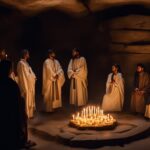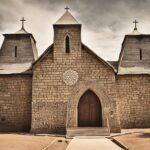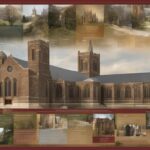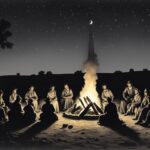The Church of Christ, Scientist has a rich history that dates back to its founding in 1879 by Mary Baker Eddy in Boston, Massachusetts. As the visionary leader, Eddy sought to restore the essence of primitive Christianity and the element of healing that had been lost over the centuries. She authored the influential book, Science and Health with Key to the Scriptures, which became the cornerstone of the Christian Science movement.
Under Eddy’s guidance, the Church of Christ, Scientist grew rapidly and established its headquarters in Boston. Today, the church has congregations throughout the world, with members passionately embracing the teachings and principles of Christian Science.
Key Takeaways:
- The Church of Christ, Scientist was founded by Mary Baker Eddy in 1879 in Boston, Massachusetts.
- Its purpose was to restore primitive Christianity and the element of healing through the word and works of Christ Jesus.
- Mary Baker Eddy authored the influential book, Science and Health with Key to the Scriptures.
- The church has its headquarters in Boston and congregations worldwide.
- The teachings and principles of Christian Science center around spiritual healing and the power of divine truth.
Beliefs and Doctrines of Christian Science
In Christian Science, believers hold a unique set of beliefs and doctrines that shape their understanding of spirituality, healing, and the nature of existence. Central to these beliefs is the recognition of God as divine Mind, and the acknowledgment that reality is purely spiritual, while the material world is considered an illusion.
Christian Scientists firmly believe in the power of prayer to heal diseases. They view sickness as a result of mental error and believe that it can be corrected through focused prayer that aligns one’s thoughts with divine truth. This approach, known as mental healing or spiritual healing, is the cornerstone of Christian Science practice.
To Christian Scientists, the concept of divine Mind is of utmost significance. They emphasize the understanding of God as the infinite source of all wisdom, intelligence, and creativity. This understanding of God as divine Mind guides their perspective on the nature of reality and enables them to see beyond the limitations of the material world.
Christian Science teaches that the material world, including illness, pain, and suffering, is an illusion. They believe that by aligning their thoughts with divine truth and recognizing their spiritual nature, individuals can overcome the illusion of sickness and experience healing at a spiritual level.
“Christian Science brings to light Truth and its supremacy, universal harmony, the entireness of God, good, and the nothingness of evil. Is the Christian Science system of healing like that set forth in the New Testament? In Principle and demonstration it is.”
This emphasis on spiritual healing and understanding the power of the divine Mind sets Christian Science apart from other religious traditions. By embracing the spiritual nature of existence and emphasizing the importance of aligning one’s thoughts with divine truth, Christian Scientists seek to experience healing and find purpose and fulfillment in their lives.

Key Beliefs and Doctrines of Christian Science:
- Reality is purely spiritual, and the material world is an illusion.
- Sickness is a result of mental error and can be corrected through prayer and aligning one’s thoughts with divine truth.
- God is understood as divine Mind, the infinite source of wisdom and intelligence.
- Healing is primarily achieved through mental or spiritual means rather than medical intervention.
- “Christian Science brings to light Truth and its supremacy, universal harmony, the entireness of God, good, and the nothingness of evil.” – Mary Baker Eddy
Sacraments and Rituals in Christian Science
Christian Science is a religious movement that does not practice traditional sacraments like baptism or the Eucharist. Instead, the emphasis is on the spiritual nature of reality and the transformative power of prayer. Christian Scientists believe that true communion with God comes through a deep understanding of spiritual truths, rather than through outward rituals.
Unlike many other Christian denominations, Christian Science does not view baptism as a necessary sacrament for salvation. Instead, baptism is understood metaphorically as a spiritual rebirth, a symbol of purification and renewal. Christian Scientists believe that the true baptism is the awakening to one’s spiritual identity as a cherished child of God.
“The waters of the Jordan would do nothing for our Lord’s consecration, if the spirit of Truth and Love bore not witness to his already acceptable and accepted individuality.” – Mary Baker Eddy
In the Eucharist, or Holy Communion, Christian Science does not partake in the traditional sharing of bread and wine. Instead, Christian Scientists find spiritual nourishment through the study of the Bible and the teachings of Mary Baker Eddy, especially her book Science and Health with Key to the Scriptures.
“Take possession of your body, and govern its feeling and action. Rise in the strength of Spirit to resist all that is unlike good. God has made man capable of this, and nothing can vitiate the ability and power divinely bestowed on man.” – Mary Baker Eddy
Christian Scientists believe that the study of spiritual truths and the application of prayer can bring about healing and communion with God. They emphasize the importance of deepening their understanding of God’s love, and embracing this love through daily prayer and the diligent study of spiritual texts.
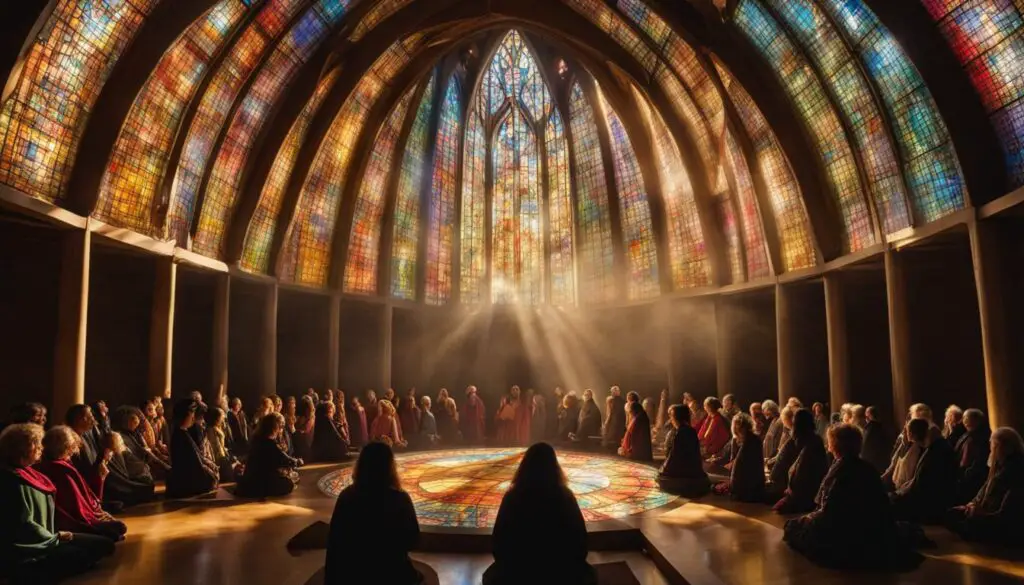
| Rituals | Description |
|---|---|
| Prayer | Christian Science places a strong emphasis on the power of prayer as a means of connecting with God and experiencing spiritual healing. |
| Bible Study | The study of the Bible is an integral part of Christian Science practice, as it provides guidance and inspiration for understanding God’s truth. |
| Science and Health | Christian Scientists study the writings of Mary Baker Eddy, particularly her book Science and Health with Key to the Scriptures, which provides a comprehensive exploration of spiritual healing and Christian faith. |
Leadership and Clergy in the Church of Christ Scientist
The Church of Christ, Scientist is guided by a dedicated leadership and clergy who uphold the teachings and principles of the faith. At the helm of the church is the Christian Science Board of Directors, a five-member executive entity responsible for overseeing the church’s affairs. This board operates in accordance with the Church Manual, a comprehensive guide that outlines the organizational structure and governance of the church.
Mary Baker Eddy, the revered founder of Christian Science, is widely acknowledged as the leader and teacher of the movement. Through her profound spiritual insights and writings, she established the foundational principles that form the bedrock of the faith. Her seminal work, Science and Health with Key to the Scriptures, serves as the primary guide for Christian Scientists as they seek to navigate the path of spiritual healing and enlightenment.
Within the Christian Science community, there are also practitioners who play a vital role in providing spiritual support and guidance. These individuals have undergone rigorous training and are deeply committed to the practice of spiritual healing. Christian Science practitioners employ prayer and a deep understanding of the teachings to help individuals overcome challenges and find healing and solace in their lives.

| Leadership and Clergy in the Church of Christ Scientist |
|---|
| Christian Science Board of Directors |
| The Christian Science Board of Directors consists of five members who oversee the affairs of the church. |
| Mary Baker Eddy |
| Mary Baker Eddy, the founder of Christian Science, is considered the leader and teacher of the movement. |
| Christian Science Practitioners |
| Christian Science practitioners provide spiritual support and guidance through dedicated practice and training. |
Worship Practices in Christian Science
In the Church of Christ, Scientist, worship is centered around prayer, Bible study, and hymn singing. Christian Scientists understand worship as a deeply personal and spiritual practice that connects them with God and fosters their growth and healing.
Individual prayer is an integral part of Christian Science worship. It allows practitioners to establish a direct connection with God and seek His guidance, support, and healing. Through prayer, Christian Scientists express their gratitude, seek forgiveness, and gain spiritual insight.
Additionally, Christian Scientists gather for Sunday church services, where members come together to collectively worship God. These services typically include the reading of selected passages from the Bible and Science and Health with Key to the Scriptures by Mary Baker Eddy, hymn singing, and prayer. The readings from both the Bible and Science and Health provide spiritual insights and inspiration for the congregation.
Christian Scientists also hold midweek testimony meetings, during which individuals share their experiences of healing and spiritual growth. These meetings provide an opportunity for members to express gratitude for the healing power of Christian Science and encourage one another on their spiritual journeys.
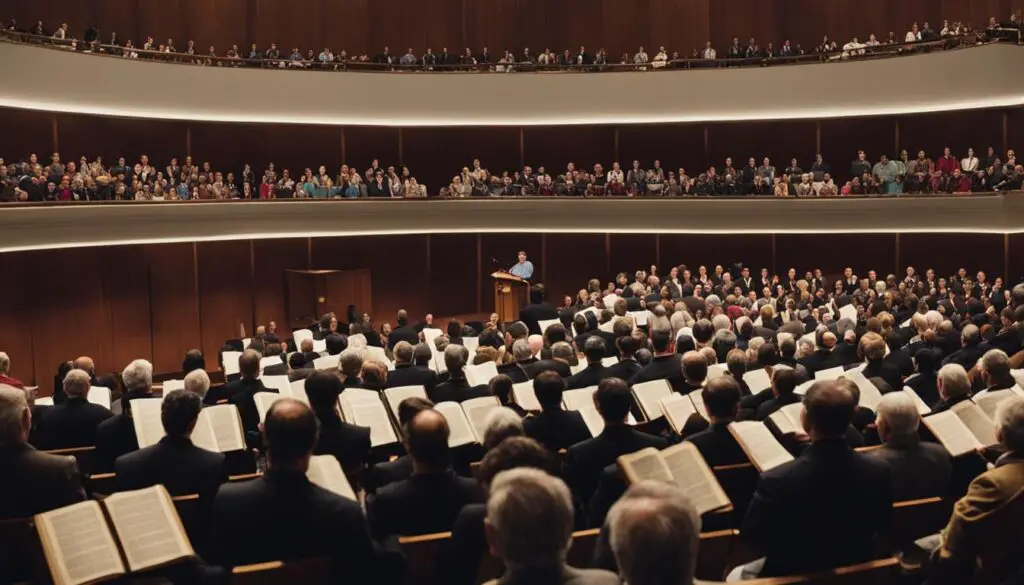
The singing of hymns is an essential aspect of Christian Science worship. Hymns are sung to uplift and inspire individuals, fostering a deep sense of connection with God and expressing the joy and gratitude felt within the community. The hymns selected for worship often reflect the themes of spiritual healing, trust in God’s guidance, and the power of prayer.
Example Hymns Frequently Sung in Christian Science Worship:
| Hymn Title | Composer | Lyrics |
|---|---|---|
| How Firm a Foundation | Attributed to Joseph Funk | Lyrics |
| All Glorious God, What Hymns of Praise | Frederick L. Hosmer | Lyrics |
| Immortal Love, Forever Full | John Greenleaf Whittier | Lyrics |
| Love Divine, All Loves Excelling | Charles Wesley | Lyrics |
| O Gentle Presence | John Greenleaf Adams | Lyrics |
Sacred Texts in Christian Science
The Church of Christ, Scientist holds two primary sacred texts: Science and Health with Key to the Scriptures and the Bible. Written by Mary Baker Eddy, Science and Health with Key to the Scriptures is considered the definitive statement of Christian Science teachings. It delves into the principles of spiritual healing and the practices of Christian faith. This profound work serves as a guide for understanding the spiritual nature of existence and the divine power within each individual.
Christian Scientists also revere the Bible as a sacred text. They frequently study its teachings, finding inspiration and guidance in its timeless wisdom. The Bible holds a central place in the Christian Science practice, providing a foundation for spiritual growth and understanding.
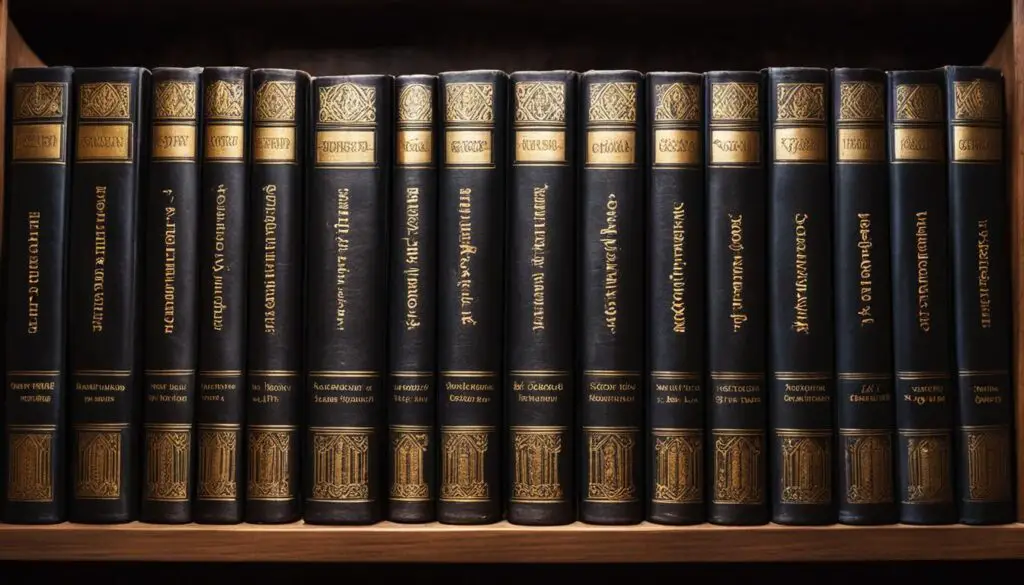
| Sacred Text | Description |
|---|---|
| Science and Health with Key to the Scriptures | Written by Mary Baker Eddy |
| The Bible | Comprises the Old and New Testaments |
Denominations and Sects within the Church of Christ Scientist
The Church of Christ, Scientist is organized around a central institution known as The Mother Church, located in Boston. The Mother Church serves as the administrative headquarters of the Christian Science Church and provides guidance and support to branch churches and societies around the world.
While there may be variations in local practices and interpretations, there is a general unity of belief and doctrine within the Christian Science movement.
Branch Churches and Societies
Within the Christian Science denomination, there are numerous branch churches and societies that exist worldwide. These branches serve as local worship centers and provide opportunities for members to gather, worship, and study the teachings of Christian Science.
“The branches of The Mother Church shall hold regular Sunday services, which shall be open to the public. They shall also hold Wednesday testimony meetings, and shall sponsor Christian Science lectures in their communities.”
– The Manual of The Mother Church by Mary Baker Eddy
The branch churches and societies adhere to the teachings of Mary Baker Eddy as outlined in her book, Science and Health with Key to the Scriptures, and the Bible. They follow the guidelines set forth in The Manual of The Mother Church and maintain a strong sense of spiritual community.
Variations in Local Practices
While the fundamental beliefs and doctrines of Christian Science remain consistent across branch churches and societies, there may be variations in local practices. These variations can include different styles of worship, hymn selection, or additional activities such as Bible study groups or Sunday school classes for children.
It is important to note that while there may be differences in local practices, these variations contribute to the richness and diversity of Christian Science as a worldwide spiritual movement.
Major Denominations and Sects in Christian Science
| Denomination/Sect | Key Beliefs |
|---|---|
| First Church of Christ, Scientist | Adheres closely to the teachings of Mary Baker Eddy and The Mother Church in Boston. |
| Independent Christian Science | Operate independently from The Mother Church and may have unique interpretations of Christian Science. |
| The Church of Christ, Scientist (Orthodox) | Follows traditional practices and interpretations of Christian Science. |
| Association of Christian Science Teachers | Focuses on education and training individuals to become Christian Science teachers and practitioners. |
Community and Outreach in Christian Science
Christian Science places a strong emphasis on community involvement and outreach, fostering connections and providing support to individuals seeking spiritual growth and healing. The Christian Science community actively engages with the public, welcoming inquiries and discussions about the teachings and practices of Christian Science.
One prominent feature within many Christian Science branches is the Christian Science Reading Room. These reading rooms serve as accessible spaces where anyone can explore Christian Science literature, engage in Bible study, and ask questions about the teachings and practices. The reading rooms provide a tranquil environment for reflection and study, fostering a sense of community and offering a place of solace for those seeking spiritual inspiration.
In addition to the reading rooms, Christian Scientists actively participate in various charitable activities, reaching out to support their local communities and beyond. These charitable efforts aim to uplift and assist those in need, embodying the Christian Science principle of loving one’s neighbor.
Moreover, Christian Science has developed an extensive publishing organization that includes the renowned international newspaper, The Christian Science Monitor. The Monitor, known for its unbiased reporting and commitment to global journalism, serves as a platform for highlighting stories that inspire, inform, and promote a greater understanding of the world.
The Christian Science Reading Room Experience
The Christian Science Reading Room offers visitors a unique experience to explore Christian Science literature in a peaceful and welcoming environment. These reading rooms typically feature:
- A wide selection of books, including The Bible, Science and Health with Key to the Scriptures by Mary Baker Eddy, and other related writings
- Magazines, periodicals, and other publications that delve into spiritual topics and offer practical insights for daily living
- Comfortable seating areas for quiet study or contemplation
- Knowledgeable attendants who are available to answer questions and engage in meaningful discussions
The Christian Science Reading Room encourages individuals from all walks of life to explore the teachings of Christian Science, discover spiritual truths, and find healing through prayer.
| Benefits of Visiting a Christian Science Reading Room | Testimonials from Visitors |
|---|---|
|
|
Contemporary Issues and Challenges in the Church of Christ Scientist
The Church of Christ, Scientist, like any religious institution, faces contemporary issues and challenges as it navigates through the complexities of the modern world. One of the main challenges the church has grappled with is the controversy surrounding the use of medical care. Christian Scientists, who believe in the power of prayer for healing, often rely solely on spiritual means to address health concerns. However, this has given rise to debates about the rights of children when it comes to medical treatment and raised questions about the effectiveness of spiritual healing in certain medical emergencies.
Moreover, the decline in membership poses a challenge for the Church of Christ, Scientist. As societal needs and expectations continue to evolve, traditional religious organizations must adapt to remain relevant. The church needs to find innovative ways to connect with a new generation and address their spiritual needs effectively. It also needs to embrace technology and modern communication channels to reach individuals who may be searching for a Christian Science church near them.
While these challenges persist, the Church of Christ, Scientist continues to inspire and impact individuals worldwide. Its emphasis on spiritual healing and the power of prayer remains a source of solace and comfort for many. Additionally, the Christian Science Monitor, a renowned international newspaper affiliated with the church, provides in-depth coverage of contemporary issues from a perspective rooted in Christian Science teachings. Through its unique publications and ongoing dedication to spiritual growth, the Church of Christ, Scientist strives to overcome challenges and bring the message of divine love, healing, and redemption to all.
FAQ
What is the history of the Church of Christ Scientist?
The Church of Christ, Scientist was founded in 1879 in Boston, Massachusetts, by Mary Baker Eddy, who authored the book Science and Health with Key to the Scriptures. The church’s purpose was to commemorate the word and works of Christ Jesus and to reinstate primitive Christianity and the element of healing that had been lost. It has since become a significant religious movement, with headquarters in Boston and congregations worldwide.
What are the beliefs and doctrines of Christian Science?
Christian Scientists believe in the power of prayer for healing diseases. They view reality as purely spiritual and see the material world as an illusion. They believe that sickness is a result of mental error and can be corrected through focused prayer that seeks to align one’s thoughts with divine truth. Christian Science emphasizes the importance of understanding God as divine Mind and recognizing the spiritual nature of existence.
What sacraments and rituals are practiced in Christian Science?
Christian Science does not practice traditional sacraments like baptism or the Eucharist. Instead, they emphasize the spiritual nature of reality and focus on prayer and the study of the Bible and Science and Health. They believe that true communion with God comes through a deep understanding of spiritual truths, rather than through outward rituals.
Who leads the Church of Christ Scientist?
The Church of Christ, Scientist is led by a five-member executive entity known as the Christian Science Board of Directors. This board oversees the business of the church according to the Church Manual, which outlines the organization’s structure and governance. Mary Baker Eddy, the founder of Christian Science, is considered the leader and teacher of the movement, and her book Science and Health serves as the primary guide for members. Christian Science also has practitioners, individuals who have received training and are dedicated to the practice of spiritual healing.
What are the worship practices in Christian Science?
Worship in Christian Science centers around prayer and the study of the Bible and Science and Health. Christian Scientists engage in regular individual prayer and often gather together for Sunday church services, which include the reading of selected passages from the Bible and Science and Health, hymn singing, and prayer. They also have midweek testimony meetings, where individuals share their experiences of healing and spiritual growth.
What are the sacred texts in Christian Science?
The primary sacred text of Christian Science is Science and Health with Key to the Scriptures, written by Mary Baker Eddy. This book is considered the definitive statement of Christian Science teachings and provides a detailed exploration of spiritual healing and Christian faith practices. In addition to Science and Health, Christian Scientists also hold the Bible as a sacred text and frequently study its teachings.
Are there denominations and sects within the Church of Christ Scientist?
The Church of Christ, Scientist is organized around a central institution known as The Mother Church, located in Boston. The Mother Church serves as the administrative headquarters of the Christian Science Church and provides guidance and support to branch churches and societies around the world. While there may be variations in local practices and interpretations, there is a general unity of belief and doctrine within the Christian Science movement.
What is the community and outreach like in Christian Science?
Christian Science encourages community involvement and outreach. Many branches of the Church have Christian Science Reading Rooms, where the public can explore Christian Science literature and ask questions about the teachings and practices. Christian Scientists also engage in various charitable activities and have an extensive publishing organization that includes the publication of The Christian Science Monitor, a renowned international newspaper.
What are the contemporary issues and challenges facing the Church of Christ Scientist?
The Church of Christ, Scientist has faced various challenges and criticisms throughout its history. One of the main issues is the controversy surrounding the use of medical care, as Christian Scientists rely primarily on prayer for healing. This has led to debates about the rights of children and concerns about the effectiveness of spiritual healing in certain medical emergencies. Additionally, the decline in membership and the need to adapt to changing societal needs and expectations are ongoing challenges for the Church. However, Christian Science continues to inspire and impact individuals around the world with its emphasis on spiritual healing and the power of prayer.






